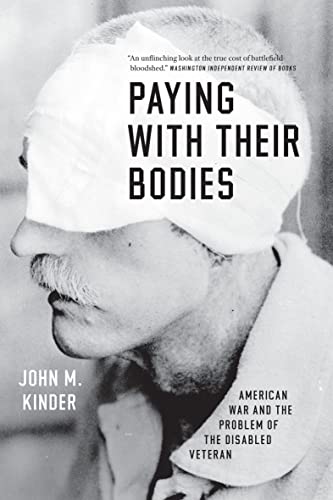Paying with Their Bodies
American War and the Problem of the Disabled Veteran
John M. Kinder
BOOK REVIEW

In the tempestuous landscape of American history, the narratives of our veterans often spiral into overlooked shadows-tales of sacrifice met with the harsh realities of returning home, particularly when the cost of service is measured in broken bodies and struggling spirits. Paying with Their Bodies: American War and the Problem of the Disabled Veteran by John M. Kinder plunges headfirst into this vortex, undressing the complex relationship between war and its aftermath, specifically how society grapples with its most vulnerable warriors.
From the very first page, Kinder demands your attention, compelling you to confront the uncomfortable truth that disabilities borne from combat are not merely statistics-they are heart-wrenching stories of shattered dreams and lost identities. In a nation that glorifies valor on the battlefield, he challenges you to reckon with the collateral damage of such glory: the men and women who return not just with physical scars but heavy psychological burdens that haunt them long after the last gun is fired.
The work is not merely an academic investigation; it's an emotional exploration that reverberates through time. Kinder skillfully stitches together personal testimonies of disabled veterans with broader historical trends, illuminating how American society's perceptions and treatment of these individuals have evolved-and often stagnated. His narrative captures the zeitgeist of our military history from World War I through the present, revealing the stark contrasts in society's reception of returning heroes versus those left severely altered by their service.
You cannot escape the emotions this book conjures. The vivid recounting of individual struggles serves as a mirror reflecting our own societal shortcomings. As you traverse through the heart-wrenching accounts of veterans-men and women who wanted nothing more than to serve their country-you're forced to confront the uncomfortable reality of how often we overlook the aftermath of their sacrifices. What does it mean to truly honor those who served when we often neglect their needs?
Yet, the emotional juggernaut doesn't stop at mere observation. Kinder's work stirs a call to action, pushing us to recognize our complicity in a system that idealizes military valor while marginalizing those who have paid the highest price. He throws down the gauntlet, suggesting the necessity for a societal reckoning; a demand for empathy and tangible support for our disabled veterans. If society honors them with hollow platitudes, what weight does that actually carry?
However, it's not all applause for the author. Critics have emerged, some suggesting that Kinder's narrative feels heavy-handed at times, almost bordering on didacticism. Such opinions detract from the profound emotional resonance of his arguments, as some readers argue it detracts from the raw personal narratives that make this book a must-read. Still, the sheer emotional impact of these veterans' stories outweighs such criticisms-your heart aches for their triumphs and crumbles under the burden of their despair.
Audiences have remarked on how Paying with Their Bodies has shifted their understanding of wartime sacrifices. Many are left reflecting on their own perceptions of veterans and their reintegration into civilian life. The profound way Kinder interlaces history with personal accounts allows each reader to walk alongside these courageous souls. You'll find that Kinder doesn't just write about these veterans; he breathes life into their experiences, ensuring they resonate long after you've turned the last page.
Ultimately, this book does more than shed light on the overlooked plight of disabled veterans; it forces you to engage with uncomfortable questions and consider your role in manifesting societal change. Kinder's words resonate-a battle for recognition that transcends mere acknowledgment. They scream for action. They urge society to build a bridge of compassion-a bridge filled with understanding, supportive policies, and relentless compassion.
And so, if you care about the soul of a nation and the price of its wars; if you are ready to face the sometimes ugly truths about valor and sacrifice, then Paying with Their Bodies should not just be a book on your shelf; it should be a call to arms-inviting you to reflect, to feel, and ultimately, to act. 💔 The stories held within this tome serve as vital reminders that behind every statistic lies a heartbeat, a narrative, and a life forever altered. Your journey through this book will likely leave you with a profound urgency: the need to ensure that those who fought for us are never left to fight their battles alone again.
📖 Paying with Their Bodies: American War and the Problem of the Disabled Veteran
✍ by John M. Kinder
🧾 480 pages
2015
#paying #with #their #bodies #american #problem #disabled #veteran #john #kinder #JohnMKinder